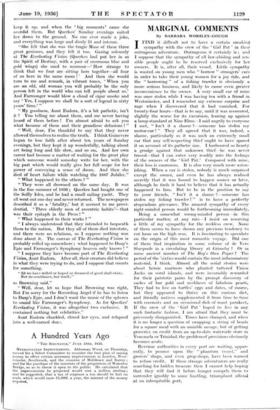MARGINAL COMMENT'S
By BARBARA WORSLEY-GOUGH
IFIND it difficult not to have a certain sneaking sympathy with the crew of the Girl Pat ' in their outrageous adventure. Outrageous it certainly is ; and I suppose that the sympathy of all law-abiding and sen- sible people ought to be reserved exclusively for her owners. It is, after all, their vessel. Little sympathy is wasted on young men who " borrow " strangers' cars in order to take their young women for a joy ride, and the " borrowing " of a fishing trawler is obviously a more serious business, and likely to cause even greater inconvenience to the owner. A very small car of mine was once stolen while I was having tea with a friend in Westminster, and I remember my extreme surprise and rage when I discovered that it had vanished. For twenty-four hours—that is to say, until it was recovered, slightly the worse for its excursion, leaning up against a lamp-standard at Nine Elms—I said angrily to everyone I met, " Isn't it a shame ?—someone has stolen my motor-car " They all agreed that it was, indeed, a shame, particularly as it was such an extremely small car that any self-respecting thief ought to have spared it on account of its pathetic size. I harboured so hearty a grudge against that unknown thief—he was never traced—that I can enter very readily into the feelings of the owners of the Girl Pat.' Compared with mine, their loss is enormous. It is also very much more aston- ishing. When a car is stolen, nobody is much surprised except the owner, and even he has always realised secretly that it was bound to happen sooner or later, although he finds it hard to believe that it has actually happened to him. But to be in the position to say to your friends, " Isn't it a shame ?—someone has stolen my fishing trawler ! " is to have a perfectly stupendous grievance. The amazed sympathy of every right-minded person would be forthcoming immediately.
Being a somewhat wrong-minded person—in this particular matter, at any rate—I insist on reserving a little of my sympathy for the reckless crew. None of them seems to have shown any previous tendency to cut loose on the high seas. It is fascinating to speculate on the origin of this most romantic voyage. Did one of them find inspiration in some volume of de Verc Stacpoole in a circulating library at Grimsby ? Or in some ancient number of The Boy's Own Paper ? The period of the 'sixties would contain the most inflammatory material, I think. Almost all the serial stories were about heroic mariners who planted tattered Union Jacks on coral islands, and were invariably rewarded for their patriotic pains by the prompt discovery of caches of bar gold and necklaces of fabulous pearls. They had to live on turtles' eggs and dates, of course, but they appeared to thrive on this curious diet, and friendly natives supplemented it from time to time with coconuts and an occasional dish of roast parakeet. If the crew of the Girl Pat ' hoped to live in any such fantastic fashion, I am afraid that they must be grievously disappointed. Times have changed, and when it is no longer a question of swapping a string of beads for a square meal with an amiable savage, but of getting groceries on credit from an up-to-date waterside store in Venezuela or Trinidad, the problem of provisions obviously becomes acute.
Revenue authorities in every port are waiting, appar- ently, to pounce upon the " phantom vessel," and grocers' shops, and even grog-shops, have been warned to refuse credit. If these strange adventurers are really searching for hidden treasure then I cannot help hoping that they will find it before hunger compels them to surrender ignobly to some bustling, triumphant official at an inhospitable port.










































 Previous page
Previous page